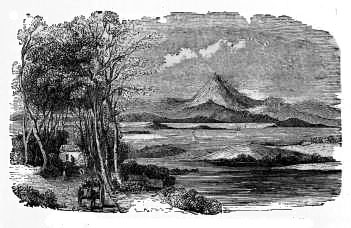Lord Charlemont and the Irish Volunteers

Bantry Bay - Scene of the landing of the French
The Volunteers deserted by their Leaders—Agrarian Outrages and their Cause—Foundation of the United Irishmen—Cruelties of the Orangemen—Government Spies and Informers—Lord Moira exposes the Cruelty of the Yeomanry in Parliament—Mr. Orr's Trial and Death—Details of the Atrocities enacted by the Military from a Protestant History—Tom the Devil—Cruelties practised by Men of Rank—Licentiousness of the Army—Death of Lord Edward FitzGerald—The Rising—Martial Law in Dublin—The Insurrection in Wexford—Massacres at Scullabogue House and Wexford-bridge by the Insurgents—How the Priests were rewarded for saving Lives and Property—The Insurrection in Ulster—The State Prisoners—The Union.
[A.D. 1783—1800.]

ARLIAMENT was dissolved on the 15th of July, 1783, and summoned to meet in October. The Volunteers now began to agitate on the important question of parliamentary reform, which, indeed, was necessary, for there were few members who really represented the nation. The close boroughs were bought and sold openly and shamelessly, and many members who were returned for counties were not proof against place or bribes. But the Volunteers had committed the fatal mistake of not obtaining the exercise of the elective franchise for their Catholic fellow-subjects: hence the Irish Parliament obtained only a nominal freedom, as its acts were entirely in the hands of the Government through the venality of the members.
On the 10th of November, one hundred and sixty delegates assembled at the Royal Exchange, Dublin. They were headed by Lord Charlemont, and marched in procession to the Rotundo. The Earl of Bristol, an eccentric, but kind and warm-hearted character, who was also the Protestant Bishop of Derry, took a leading part in the deliberations. Sir Boyle Roche, an equally eccentric gentleman, brought a message from Lord Kenmare to the meeting, assuring them that the Catholics were satisfied with what had been granted to them. He had acted under a misapprehension; and the Bishop of Derry, who was in fact the only really liberal member of the corps, informed the delegates that the Catholics had held a meeting, with Sir Patrick Bellew in the chair, in which they repudiated this assertion.
Several plans of reform were now proposed; and a Bill was introduced into the House by Mr. Flood, on the 29th of November, and warmly opposed by Mr. Yelverton, who was now Attorney-General, and had formerly been a Volunteer. A stormy scene ensued, but bribery and corruption prevailed. The fate of the Volunteers was sealed. Through motives of prudence or of policy, Lord Charlemont adjourned the convention sine die ; and the flame, which had shot up with sudden brilliancy, died out even more rapidly than it had been kindled. The Volunteers were now deserted by their leaders, and assumed the infinitely dangerous form of a democratic movement. Such a movement can rarely succeed, and seldom ends without inflicting worse injuries on the nation than those which it has sought to avert.
The delegates were again convened in Dublin, by Flood and Napper Tandy. They met in October, 1784, and their discussions were carried on in secret. Everywhere the men began to arm themselves, and to train others to military exercises. But the Government had gained a victory over them in the withdrawal of their leaders, and the Attorney-General attempted to intimidate them still further by a prosecution. In 1785 a Bill was introduced for removing some of the commercial restraints of the Irish nation; it passed the Irish House, but, to satisfy popular clamours in England, it was returned with such additions as effectually marred its usefulness.
Grattan now saw how grievously he had been mistaken in his estimate of the results of all that was promised in 1782, and he denounced the measure with more than ordinary eloquence. It was rejected by a small majority, after a debate which lasted till eight o'clock in the morning; and the nationality of the small majority purchased the undying hatred of the English minister, William Pitt. The people were still suffering from the cruel exactions of landlords and tithe-proctors. Their poverty and misery were treated with contempt and indifference, and they were driven to open acts of violence, which could not be repressed either by the fear of the consequences, or the earnest exhortations of the Catholic bishops and clergy.[4]
Notes
[4] Clergy.—Barrington says, in his Rise and Fall of the Irish Nation, p. 67, the Catholic clergy had every inclination to restrain their flocks within proper limits, and found no difficulty in effecting that object. The first statement is unquestionably true; the second statement is unfortunately disproved by many painful facts.
